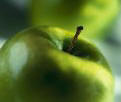|

FOR IMMEDIATE RELEASE:
20 February 2001
UC DAVIS STUDY FINDS HEART BENEFITS FROM APPLES &
JUICE
SACRAMENTO, Calif. --
Researchers at UC Davis School of Medicine have determined that drinking
apple juice and eating apples has a beneficial effect on risk factors for
heart disease. Results of the pioneering clinical study appear in the winter
edition of Journal of Medicinal Food.
The study shows that compounds in apples and apple juice
act in much the same way that red wine and tea do to slow one of the
processes that lead to heart disease. These compounds act as antioxidants to
delay the break down of LDL or "bad" cholesterol. When LDL oxidizes, or
deteriorates in the blood, plaque accumulates along the walls of the
coronary artery and causes atherosclerosis.
"Previous studies have shown that eating fruits and
vegetables is associated with a reduced risk of coronary artery disease,"
says Dianne Hyson, a registered dietitian and lead researcher of the study.
"But this is the first clinical study to show the potential benefits of
active compounds in apple juice and apples."
Hyson and her colleagues previously conducted an in vitro,
or lab study, to show that apples and their juice contain beneficial
phytonutrients, or plant compounds, that function as potent antioxidants.
Their next step was to conduct an in vivo, or human trial, to determine
whether the compounds actually protect the heart by slowing the process of
LDL oxidation.
Although Hyson expected to see positive results from
drinking apple juice and eating apples, she was surprised to find beneficial
effects after only six weeks.
"A very moderate intake of apple juice or apples has the
potential to reduce risk factors for heart disease in a fairly short period
of time," she says. "These small diet changes might play an important role
in a heart healthy diet."
During the 12-week clinical study, 25 healthy adult men
and women added either 12 ounces of 100 percent apple juice or two apples
into their daily diet without changing anything else. Half of the
participants drank 100 percent apple juice daily for six weeks while the
other half ate apples including the peel. The varieties of apples the group
consumed included Fuji, Golden Delicious, Granny Smith and Red Delicious.
After six weeks, the subjects switched groups.
Each participant kept a detailed five-day food record
every two weeks, and researchers monitored the subjects' body weight
throughout the 12-week study period. There were no significant differences
in the intake of dietary fat, cholesterol, total carbohydrate, sugar or
calories.
Researchers measured levels of LDL oxidation lag time
before the study and at each six-week interval. Lag time measurements are
commonly used to determine how long it takes for cholesterol to oxidize or
break down when exposed to certain chemicals. A longer lag time indicates a
greater delay in the start of oxidation, which is associated with a reduced
risk of heart disease.
Study results were more dramatic in subjects drinking
apple juice, showing a 20 percent increase in lag time after six weeks, but
eating apples also showed potential health benefits, including reduced
oxidation markers and a 22 percent increase in dietary fiber.
Jack Farrell, a UC registrar on the Davis campus, says he
didn't give the study much thought while he was involved, but when the
results came in six months later, he was struck by the marked decrease of
LDL in his blood. Cholesterol levels that had been borderline were now
within the healthy range. The father of two young children, Farrell decided
apple juice wasn't just for their lunch box, but for his as well.
"If I can get this result from just drinking 12 ounces of
apple juice a day, it's definitely worth making part of my daily routine,"
he says.
###
The study was funded with an unrestricted grant from the
United States Apple Association and Processed Apple Institute. The two
industry funders had no input regarding the design of the study, its
execution, interpretation, analysis of the data, writing of the manuscript,
or approval of the manuscript text prior to submission to the journal.
This page last updated February, 20, 2001
Copyright UC Regents. All rights reserved.
(more news) |
